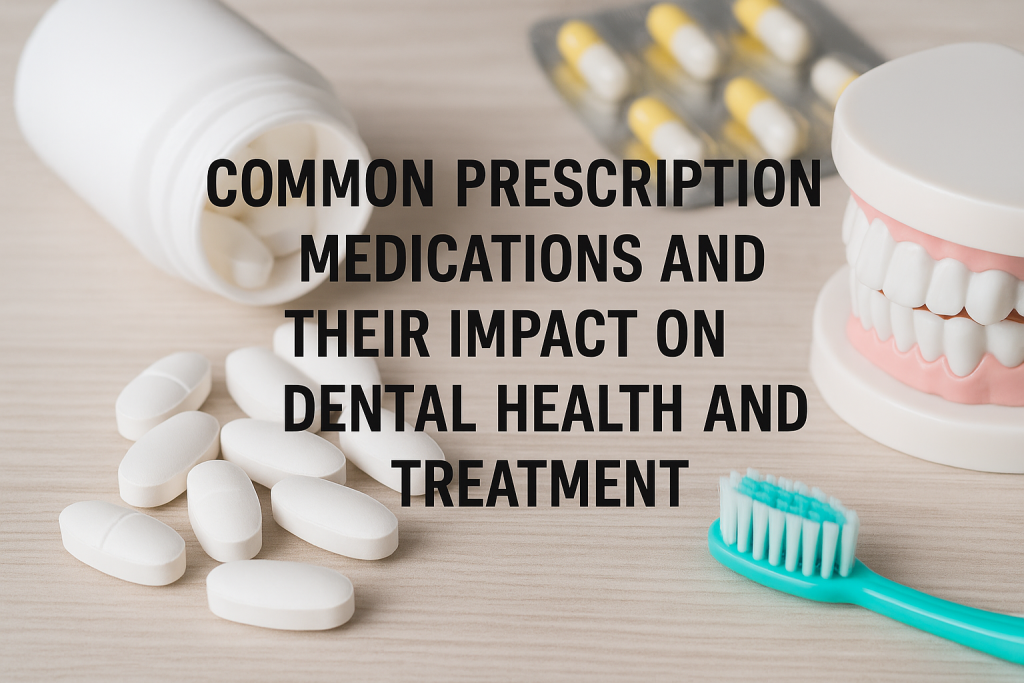
Prescription medications play a vital role in managing health conditions like high blood pressure, depression, anxiety, and diabetes. However, many of these drugs can have serious effects on your oral health — from increasing the risk of cavities to complicating dental procedures.
Understanding the connection between medications and dental health helps both patients and dental professionals prevent complications and plan for safe, effective treatment.
1. Antihypertensive Medications (Blood Pressure Drugs)
Common examples: Lisinopril, Amlodipine, Metoprolol
- Oral side effects:
- Xerostomia (dry mouth): Can increase the risk of cavities, bad breath, and oral infections.
- Gingival hyperplasia: Gum overgrowth that complicates brushing, flossing, and periodontal therapy.
- Orthostatic hypotension: Dizziness or fainting when standing after treatment.
- Dental care tips:
- Hydrate frequently and consider saliva substitutes.
- Rise slowly from the dental chair.
- Discuss gum management options with your dentist.
- Related service suggestion: Periodontal Care at Lakeside Dental Arts
2. Antidepressants and Antianxiety Medications
Common examples: Sertraline, Fluoxetine, Diazepam, Alprazolam
- Oral side effects:
- Dry mouth and increased cavity risk.
- Bruxism (teeth grinding), which can lead to TMJ discomfort.
- Impaired blood clotting during extractions or deep cleanings.
- Dental care tips:
- Consider a night guard if grinding is present.
- Inform your dentist before any surgical procedures.
- Maintain consistent home care and professional cleanings.
Tip: TMJ discomfort and bruxism are common but treatable.
3. Anticoagulants and Antiplatelet Drugs
Common examples: Warfarin, Eliquis, Clopidogrel (Plavix), Aspirin
- Oral side effects:
- Prolonged bleeding during dental treatment.
- Dental care tips:
- Never stop these medications without physician approval.
- Your dentist may coordinate with your physician to safely adjust treatment.
Safety first: bleeding risk can be managed with the right precautions.
4. Bisphosphonates (Osteoporosis Medications)
Common examples: Fosamax, Reclast, Boniva
- Oral side effects:
- Osteonecrosis of the jaw: A rare, serious condition that affects bone healing after extractions or implant placement.
- Dental care tips:
- Inform your dentist before any oral surgery.
- Treatment plans may need to be adjusted to reduce risk.
- Preventive care is critical.
5. Antihistamines and Decongestants
Common examples: Benadryl, Claritin
- Oral side effects:
- Dry mouth and increased risk of decay.
- Mouth soreness or burning sensations.
- Dental care tips:
- Stay hydrated.
- Use products like Biotene and sugar-free lozenges to stimulate saliva.
6. Antidiabetic and Weight Loss Medications
Common examples: Ozempic, Jardiance, Wegovy, Insulin
- Oral side effects:
- Reduced saliva flow and taste changes.
- Vomiting can lead to enamel erosion.
- Poorly controlled diabetes may delay healing and increase infection risk.
- Dental care tips:
- Keep blood sugar well managed.
- Schedule dental visits strategically to avoid hypoglycemia.
- Address erosion early with fluoride and enamel-protective treatments.
7. Immunosuppressants and Steroids
Common examples: Prednisone, Tacrolimus
- Oral side effects:
- Increased vulnerability to oral infections (like candidiasis).
- Tissue fragility and delayed healing.
- Possible need for pre-procedure antibiotics.
- Dental care tips:
- Communicate openly with your dental team.
- Follow infection prevention protocols after surgery.
- Maintain meticulous oral hygiene.
Why Medication Disclosure Matters
Many patients don’t realize how much their prescription medications affect their oral health. Your dentist isn’t just treating your teeth — they’re protecting your overall well-being.
Always:
Bring an updated list of all medications to your dental appointments.
Never stop or adjust medication on your own.
Communicate any side effects like dry mouth, bleeding, or discomfort to your dental provider.
Final Thoughts: Partnering With Your Dentist
Prescription medications are essential for managing systemic health, but with the right approach, dental treatment can still be safe and effective.
Tell your dentist about your medications.
Ask questions about how your prescriptions may affect oral health.
Stay proactive with preventive dental care.
David E Willey, DMD
Lakeside Dental Arts
 Join Our Team!
Join Our Team!
